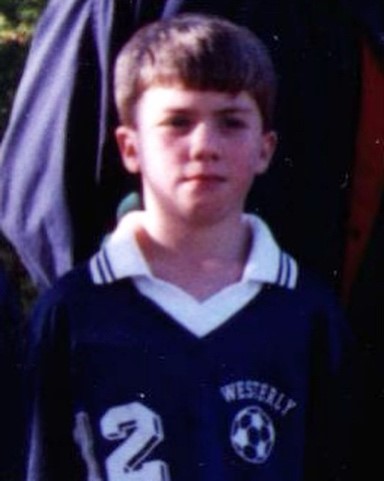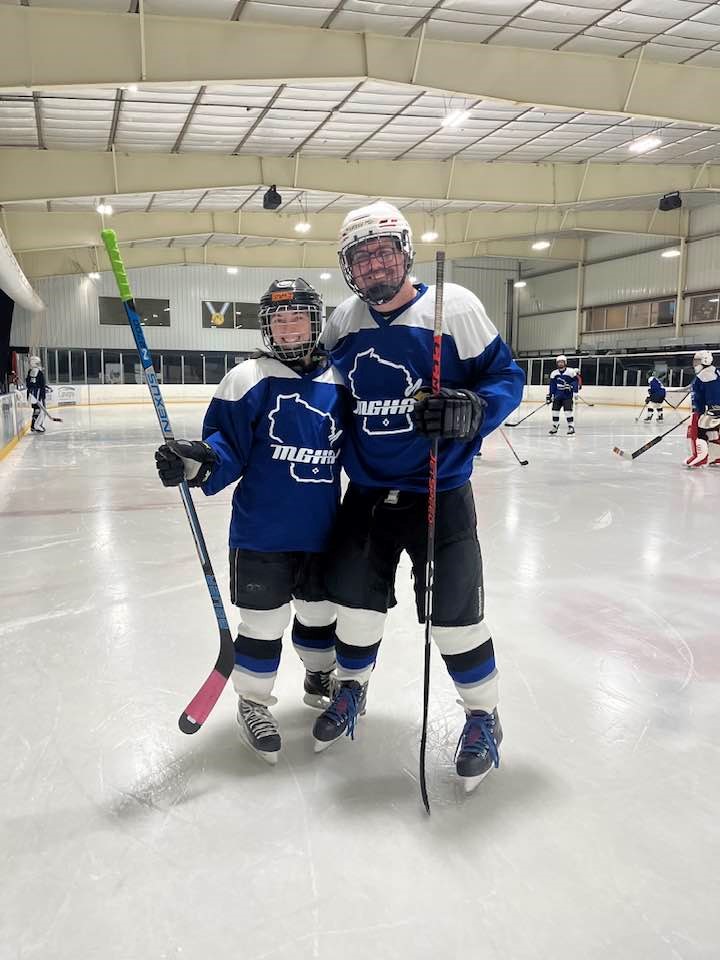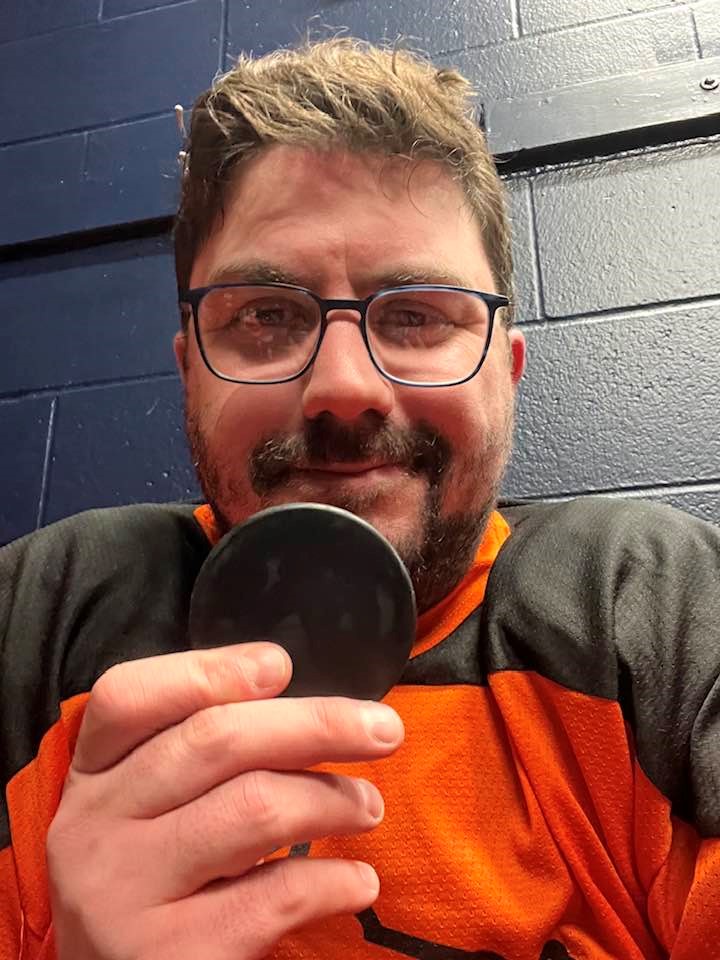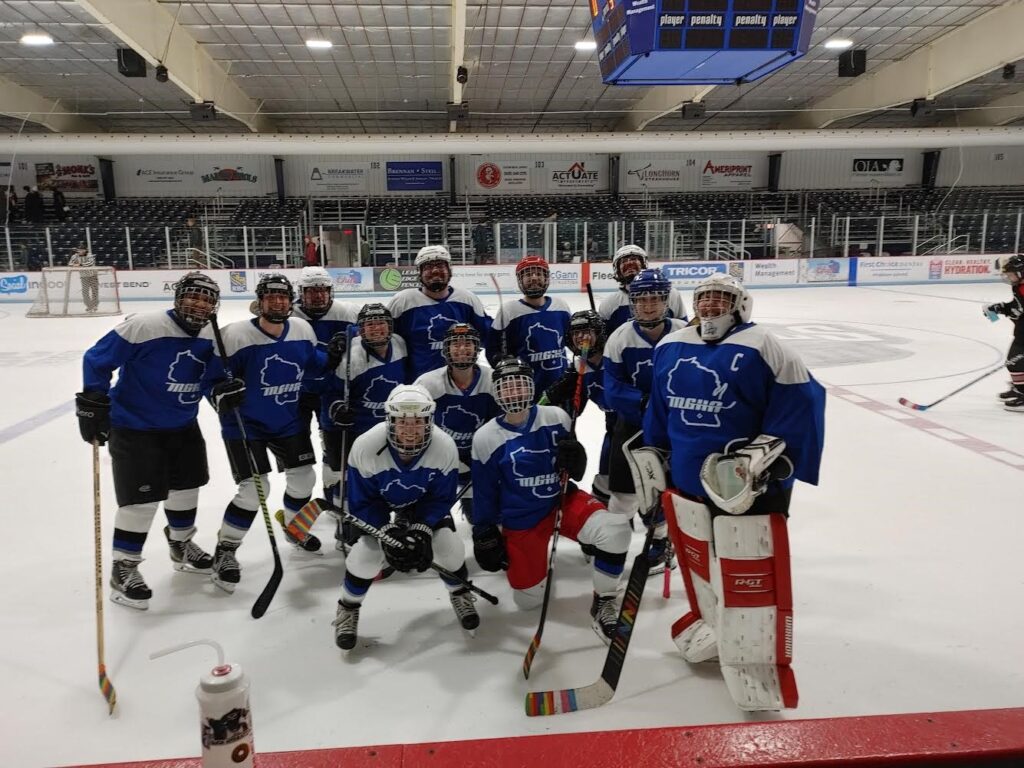My Hockey Story:
I have loved hockey all my life. I grew up going to hockey games with my family, watching college and professional hockey on TV, and talking about hockey for as long as I can remember but never playing it. When I was young, we would go skating at the local park as a family, and while taking breaks from the ice, I would watch the big boys play on the lit-up, fenced-in hockey rink. I was silently envious because I couldn’t join them—first, I was a girl, and second, I was too small. But sometimes when it wasn’t busy, I would go out and skate on that hockey rink and pretend that I was playing with the big boys.
Growing up in Minnesota, I recall having a cheap, kid-friendly street hockey set with a rolling puck, plastic hockey sticks, and a small net. We’d play out in the street, on someone’s big driveway, or in the local cul-de-sac. Like many kids, I distinctly remember yelling “CAR!” and diving out of the way whenever we’d be interrupted by someone driving through the neighborhood.
When I was 7 or 8, my parents enrolled me in figure skating lessons, thinking maybe I would enjoy learning to skate better. After only a few lessons, I knew one thing about figure skating: I hated that damn toe pick. I asked for (more like demanded :D) hockey skates and was obliged. I finished the remainder of the lessons with my own hockey skates.
When the opportunity presented itself to try playing girls’ hockey in late elementary school, my mom gave me a choice: you can play hockey or you can play softball, but not both. But secretly, my dad pulled me aside and told me I should continue playing softball because hockey was too expensive, and we really couldn’t afford it. Later in life, he told me that he was also afraid I wouldn’t enjoy hockey because I was brand new to it and would not be the best player. He was afraid I would give up on hockey and then never go back to softball. Oh, how little he knew me at that time.
Regardless, I continued to play softball throughout high school and was happy with my choice. I became a 4-season athlete: tennis, cross-country skiing, track, and softball. I was also in several extracurriculars, one of which was marching band. As a part of our band grade, we were required to participate in a certain number of pep band events. I loved playing my trumpet, so I signed up for every event that didn’t conflict with my activities, but my favorite pep band events were always ice hockey. While others in the band would goof off and head to the lobby to buy snacks/sodas, I vigilantly watched the games. At one point, I even considered signing up to be a hockey cheerleader just so I could attend all the boys’ games and skate on the ice, but I was never, nor will I ever be “cheerleader material.”
My LGBTQ+ Story:
In high school, I had a lot of queer friends (especially in marching band and drama!), but I never considered myself a part of the LGBTQ+ community. I was an ally and the occasional gay beard for a closeted friend, but at that time I wasn’t a member of the Gay-Straight Alliance, and I “knew” I was straight–more like I was afraid to think differently. I came from a religious background where some people considered homosexuality a sin. While my hometown was large and had a variety of beliefs and ideologies, being openly gay in high school was still unsafe, and my friends who came out were incredibly brave.
Fast forward to college, when I joined the softball team as a walk-on. I played with the team for only part of my first year before quitting due to illness, but this was the very first space I can remember where I was around openly gay women. I know the stereotype about softball players is not (always) true, but in this case, it applied. It was also the first time I was in a sex-positive space.
At first, I’ll admit I was uncomfortable. I’d never been around women who were so open about their sexuality, but in the end, it allowed me to start to self-reflect and explore. That year, in some of my exploratory choices, I made out with a female friend at a party and realized I liked it. But with that feeling of attraction also came a boatload of traumatic guilt, so I put my feelings for women on the back burner and didn’t acknowledge them again for a long time.*
Many folks say college is an awakening, a space where you learn about yourself, grow, and become the adult you were meant to be. It’s cliché, and I cannot say that was entirely true for me. Were my eyes opened to new experiences? Absolutely. Did I grow as a human? Obviously, yes. Did I awaken into a new person? No.
I went to one of the most liberal seminaries in the country for graduate school. Many of my colleagues were LGBTQ+, and many became close friends. One of them, let’s call her Leah, was the first to recognize that I wasn’t as straight as I presented. Reflecting on it now, I wonder if her friendship was because of initial attraction or my need for a gay female mentor. Either way, I looked up to her. She was who I wanted to be. I wanted to be open about my sexuality and be content to publicly be who I truly am, without shame, guilt, or the fear that others will judge me. Nothing became of that relationship except friendship, but I learned so much from her and I am still grateful for her.
What Gay Hockey Means to Me:
This is where my two stories from above combine. In the summer of 2018, I was completely broke and miserable in graduate school; I needed a change in my life before depression took full hold. All my romantic relationships during that time had failed because I wasn’t being my true self, and I didn’t even have the energy to try. Therefore, I quit graduate school and eventually accepted a job at the University of Wisconsin–Madison in an IT-adjacent role.
In my new position, I wanted to network with folks across campus, so I joined the IT Professionals Committee, where I met Amanda, the (at the time) president of the MGHA. She was exceptionally intimidating at first: someone who had been in the IT industry for a while, who was charismatic and professional, and who also played hockey. (Don’t tell her, but I may have weaseled my way into her circle just so we could become friends.) She knew of my love of hockey, and after a few years of cajoling, she finally convinced me that I should apply to play hockey in the MGHA.
(My previous arguments and Amanda’s responses: I haven’t skated in ages – doesn’t matter, it’ll come back; I can’t afford gear because of graduate school debt – we’ll help you get some; how will I know if I like it? — *Amanda just laughs in my face*)
I couldn’t have imagined what a community of queer hockey folks would look like, especially because I never thought such a thing could exist. I had never heard of a queer sports league. I expected a small group of players and only a few teams, not the second largest (and now largest!) gay hockey league in the world. I was hesitant but excited to see what I was signing up for.
Before I applied, Amanda warned me that I might not have priority because I wasn’t LGBTQ, but I disclosed to her that I was bisexual, just not very open about it. However, I decided at that moment that if I joined the MGHA, I would be my true self. I was done being afraid of what others thought and I wasn’t going to hide my queerness anymore.
What surprised me the most at our first practices and events was how welcoming everyone was. I also realized I knew quite a few people who played in the league already or who were joining along with me. I had been in a few queer spaces and been to a few gay bars in the past, but I never felt like I belonged in those spaces. Being bisexual makes me feel like we’re LGBTQ+ “lite” because we have both heterosexual and homosexual relationships, but unless we’re in a homosexual relationship we’re not a part of the “club.” I had never had a serious relationship with a woman yet, so I always felt like an outsider, more ally than member.
I have now played 4 seasons of hockey with the MGHA, and they have changed my life for the better. I have learned so much about playing hockey and I love being on the ice instead of in the stands. I have also made huge strides in being myself both on and off the ice. It has been so freeing to stop holding back who I am. I am a proud bisexual woman.
I have had a few crushes and a relationship stemming from my time in MGHA, but my highlight has been the friendships I have made and rekindled from hockey and the new social circles I find myself in. I have finally come out of my shell, and I feel more confident than ever, all because of my time playing in a gay hockey league.
So, what does gay hockey mean to me? It means the world.
*Funny side story: As a part of the softball team, we were so sex-positive that we painted boobs on the school’s bench (the equivalent to most schools’ painted rock) in the fall with the expectation that it would stir up some drama. Normally it would have to stay up for at least 48 hours and so the alumni returning for homecoming would see it and be concerned. Sadly, it was painted over 10 hours later and so the story just became a legend. (https://morningside.advantage-preservation.com/viewer/?k=spoonholder&i=f&d=01011897-12312010&m=between&ord=k1&fn=scan_20020117_20061207_0376&df=1&dt=10)




